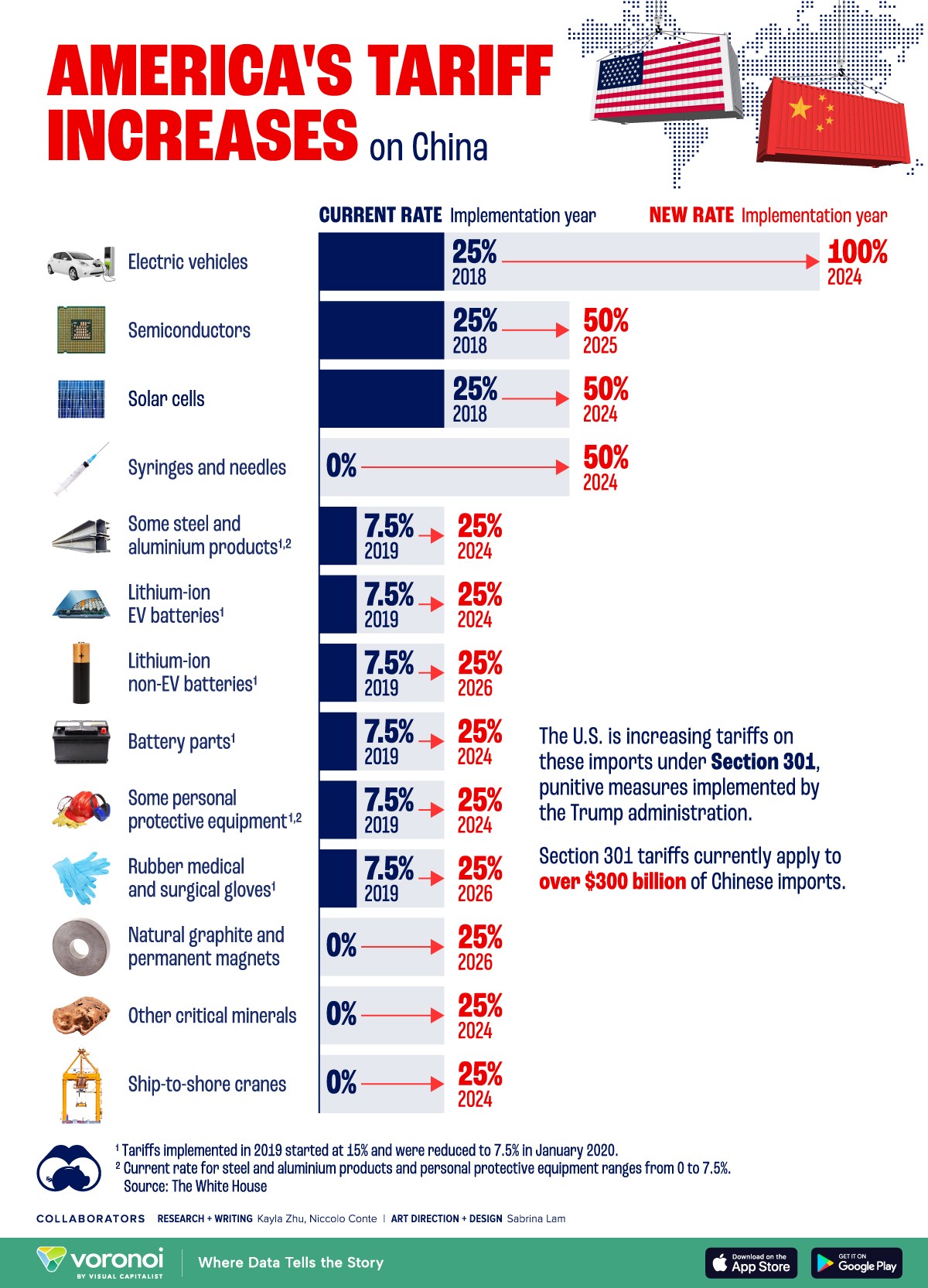New tariffs on Chinese goods
President Joe Biden has imposed significant new tariffs on a range of Chinese goods, including electric vehicles, advanced batteries, solar cells, steel, aluminium, and medical equipment. This policy by the US will escalate tensions between the two biggest global economies. On Tuesday, the Democratic president pointed out that the Chinese government’s subsidies allow its companies to operate without needing to make a profit, thereby skewing the balance of international trade in their favour.
2. In a recent statement made in the Rose Garden of the White House, Biden asserted that American workers have the capacity to outperform and outcompete anyone, provided the competition is fair. However, he noted that the playing field has been uneven for a long time. He criticized the Chinese government for its long-standing practice of heavily subsidizing Chinese companies, arguing that this is not competition, but rather cheating.
3. In response, China immediately vowed to retaliate. The Ministry of Commerce in Beijing expressed its opposition to the U.S.’s tariff increases and pledged to take steps to protect its interests. Biden plans to maintain the tariffs implemented by his Republican predecessor, Donald Trump, while escalating others. This includes a fourfold increase in duties on electric vehicles to over 100 percent, and a doubling of tariffs on semiconductors to 50 percent.
4. The White House announced new measures impacting $18bn worth of Chinese imports, including items such as steel and aluminium, semiconductors, electric vehicles, critical minerals, solar cells, and cranes. While the figure related to electric vehicles has garnered significant attention, it may have more of a symbolic than a practical effect in the U.S., given the country’s minimal importation of Chinese electric vehicles.
5. In 2023, the U.S. brought in goods worth $427bn from China and sent out exports valued at $148bn to the same nation, which is the world’s second-largest economy, as per data from the U.S. Census Bureau. This trade deficit, which has been a constant for many years, is becoming an increasingly contentious issue in Washington.
6. Katherine Tai, the U.S. Trade Representative, stated that the updated tariffs were warranted due to China’s infringement on U.S. intellectual property rights. However, Tai suggested exemptions for several categories of industrial machinery imports from China, inclusive of 19 specific to equipment used in solar product manufacturing.
7. The imposition of tariffs occurs amidst an intense campaign between Biden and his Republican forerunner, Trump, each vying to demonstrate their toughness on China. In response to Trump’s remarks that China was taking advantage of the U.S., Biden countered by suggesting that it was Trump who had been enabling them for quite some time. Biden, representing the Democrats, criticized Trump for not delivering on his promise to address Chinese trade malpractices during his presidential term.
8. Karoline Leavitt, the press secretary for Trump’s campaign, labelled the newly imposed tariffs as a “feeble and ineffective effort” to divert attention from Biden’s endorsement of Chinese electric vehicles in the United States. Trump argues that this will result in job losses in automobile sector. However, officials from the administration have stated that their actions, in conjunction with domestic investments in crucial sectors, are unlikely to exacerbate the current inflation issue that has already upset U.S. voters.
9. Despite the positive economic indicators of low unemployment and above-average economic growth, Biden has found it challenging to persuade voters about the effectiveness of his economic strategies. A recent Reuters/Ipsos survey revealed that Trump held a seven-point advantage over Biden in terms of the economy. Experts have cautioned that a trade dispute could escalate the overall costs for Electric Vehicles (EVs), potentially undermining Biden’s environmental objectives and his ambition to generate manufacturing employment.
10. Biden has expressed his desire to triumph in this competitive era with China, without initiating a trade conflict. He has been actively engaging in direct discussions with Chinese President Xi Jinping in an attempt to reduce tensions. The 2024 US presidential contenders have both deviated from the previously dominant free-trade agreement in Washington, a phase that concluded with China’s admission to the World Trade Organization in 2001. Trump’s extensive application of tariffs during his presidency from 2017 to 2021 sparked a tariff dispute with China.
11. In the much-anticipated tariff revision, Biden plans to escalate tariffs on EVs from 25 percent to 100 percent this year, resulting in total duties of 102.5 percent. Tariffs on lithium-ion EV batteries and other battery components will rise from 7.5 percent to 25 percent, and those on photovoltaic cells used in solar panels will increase from 25 percent to 50 percent. Certain essential minerals will see their tariffs elevated from zero to 25 percent. Additional tariffs are expected to be imposed in 2025 and 2026 on semiconductors, lithium-ion batteries not used in electric vehicles, graphite, permanent magnets, and rubber gloves used in medical and surgical procedures.
12. Several legislators have advocated for substantial increase in tariffs on Chinese vehicles or a complete prohibition due to concerns about data privacy. Currently, the import of light-duty vehicles manufactured in China is relatively low. The United Auto Workers, a union of significant political influence that has backed Biden, stated that the tariff adjustments would guarantee a fair transition to electric vehicles. 13. The intensifying trade dispute between the U.S. and China, driven by Biden’s substantial tariff hikes on various Chinese commodities, underscores the intricacies of global commerce. Despite the obstacles, Biden is steadfast in his commitment to promoting fair competition and safeguarding American interests. This stance is likely to pose significant challenges for China, as the increased tariffs could limit the entry of Chinese products into the U.S. market. Consequently, this could impact China’s access to the profitable U.S. market.













